Homily of Father Leocir Pessinion the Occasion of the Celebration of the Eucharist to Commemorate the One Hundred and Fiftieth Anniversary of the Death of the Blessed
Maria Domenica Brun Barbantini (22 May 2018)
The Blessed Maria Dominica Brun Barbantini,
Young wife, mother, widow, woman religious and Blessed!
(17.1.1789-22.5.1868)
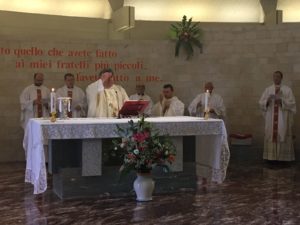 Dear Sister Lauretta Gianesin, Mother Superior of the women Ministers of the Sick of St. Camillus; esteemed members of the General Council; dear women Ministers of the Sick; consecrated men and women who are inspired by the charism of St. Camillus; lay people and those devoted to the Blessed Barbantini, who are present at this fine and historic celebration of the Eucharist on the occasion of the one hundred and fiftieth anniversary of the transit to heaven of our dear Blessed Maria Domenica Brun Barbantini.
Dear Sister Lauretta Gianesin, Mother Superior of the women Ministers of the Sick of St. Camillus; esteemed members of the General Council; dear women Ministers of the Sick; consecrated men and women who are inspired by the charism of St. Camillus; lay people and those devoted to the Blessed Barbantini, who are present at this fine and historic celebration of the Eucharist on the occasion of the one hundred and fiftieth anniversary of the transit to heaven of our dear Blessed Maria Domenica Brun Barbantini.
We have just listened to the inspiring words of the Biblical texts of today’s liturgy (Is 58:6-11; Ps 111; Mt 25:31-46) whose contents became the source of the motivations of the life and the heroic vocational choice of our Blessed Maria Domenica. I would like to share with you some facts and experiences of the life of this woman which struck me and made me reflect when reading her autobiography. But to begin with, I would like to define what unites us by engaging in some glimpses at our history.
Assembled Together for the Eucharist of Thanksgiving
What brings us together here today is the life and the work of the Blessed Barbantini which continues in history through her beloved daughters: the religious of the women Ministers of the Sick of St. Camillus. Before learning about the history and the life of our beloved Blessed, I had the joy, when I was a young Camillian in the 1980s and 1990s, of living with some of her distinguished daughters in the South of Brazil (the State of Rio Grande do Sul), working with them in providing pastoral care in health and in the animation of consecrated people active in the field of health of that region and subsequently throughout Brazil.
Our mutual ties of respect and friendship grew and they were certainly fruitful in the animation of consecrated life at that time: Sister Tomasina Gheduzzi, an Italian woman religious who had left Italy and became a Brazilian in her heart; and Sister Juliana Fracasso, a Brazilian woman religious who as a missionary left Brazil and adopted Italy in her heart.
I also remember with esteem and affection Sister Marisa Mozena, a former Provincial Superior, and Dilce Pazin (now the Superior of the generalate house of Rome). Providence, today, has brought together Sister Giuliana, Sister Tomasina (both of who are former Superior Generals), Sister Marisa (a former Provincial Superior) and myself, the humble representative of the Camillian men religious, around this Eucharist. God has His plans that are certainly not our plans and they always surprise us! It is important to be always ready in our minds and hearts, open to the inspirations of the Spirit. Therefore, with the Psalmist we can pray with gratitude: ‘how inscrutable are your ways O Lord’!
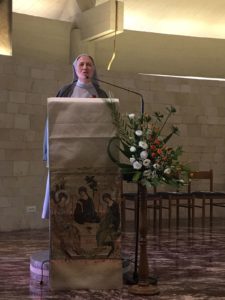 The Story of a Young Woman with a Message of Self-Overcoming of Incredible Contemporary Relevance
The Story of a Young Woman with a Message of Self-Overcoming of Incredible Contemporary Relevance
I confess that after knowing each other and this familiarity and this friendship with these daughters of the Blessed Barbantini, it was not difficult to read, explore and love the story of this extraordinary woman, an authentic prophet of mercy of the Lord, who had periods and experiences of her life which were by no means easy. Hers was a life marked by episodes of mourning and sufferings of every kind.
For people it is easy to be moved in the face of the historical sequence of the life of this young wife, mother, widow, woman religious, servant of God and Blessed and a woman who – without doubt – in a not very distant future, we hope, will be acknowledged and declared a saint. She strikes us, she enthuses us, and she calls on us: her deep trust in Divine Providence; her constant searching for the will of God; and her tenacious attachment to the mercy of God that always saves us from our imperfections and sins.
As a woman she always demonstrated a tenacious determination and at the same time a serene and trusting abandonment to the Providence of God when she undertook projects without any guarantee that there would be resources for them, and not without debts, precisely because she believed that this was the will of God. Perhaps the most unusual and dramatic aspect of her life was that she went through numerous episodes of mourning for her family relatives (her husband Salvatore and her son Lorenzo), she overcame her pain, and she was reborn stronger in her faith and in her service to people in need. Her faith was expressed in practical terms through her passion for the advent of the Kingdom of God (she founded the Convent of the Visitation of Mary) and in her compassion for her neighbour (above all else poor sick people). She founded a Congregation dedicated to the sick that was known at that epoch as the Oblate Nursing Sisters of Our Lady of Sorrows and which is recognised officially today as the women Religious Ministers of the Sick of St. Camillus.
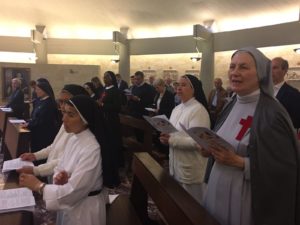 Today every diagnosis carried out on the state of consecrated religious life indicates that we are living in an epoch of disenchantment and uncertainty. At the roots of this worrying reality we can perceive, as one of the principal causes, the lack of a ‘living spirituality’ that nourishes the steps of human beings destined to be the proclaimers, witnesses and prophets of the Kingdom proclaimed by Jesus, through the precariousness of human projects as well. The very much invoked ‘revitalisation’ of religious life cannot be achieved without a retrieval of this spirituality which draws upon the original sources and must constantly return to the leading roots of our founding charisms. There is an increasingly urgent need to reconnect with the first insights of our Founders and to rediscover our fundamental and crystalline spiritual motivations, eliminating the dust that has been accumulated over time (institutionalisation), and updating them according to the contemporary needs of our histories. We must rediscover and be inspired by that first love of our Founders!
Today every diagnosis carried out on the state of consecrated religious life indicates that we are living in an epoch of disenchantment and uncertainty. At the roots of this worrying reality we can perceive, as one of the principal causes, the lack of a ‘living spirituality’ that nourishes the steps of human beings destined to be the proclaimers, witnesses and prophets of the Kingdom proclaimed by Jesus, through the precariousness of human projects as well. The very much invoked ‘revitalisation’ of religious life cannot be achieved without a retrieval of this spirituality which draws upon the original sources and must constantly return to the leading roots of our founding charisms. There is an increasingly urgent need to reconnect with the first insights of our Founders and to rediscover our fundamental and crystalline spiritual motivations, eliminating the dust that has been accumulated over time (institutionalisation), and updating them according to the contemporary needs of our histories. We must rediscover and be inspired by that first love of our Founders!
This is why when we read the biography of a person, and we learn about their life histories, we enter into living contact with that biography, touching the very essence of someone, a person, as they are, without the historical cultural filters and interpretations that at times are overly pious and devotional and do not always transit the crystalline truth of that person in the wholeness of their existence. Allowing the person to speak and write about themselves is the best way of knowing someone in the authenticity of their being. It is the person who speaks with their original voice! This is a valuable legacy of the Founder to her followers of today and of tomorrow.



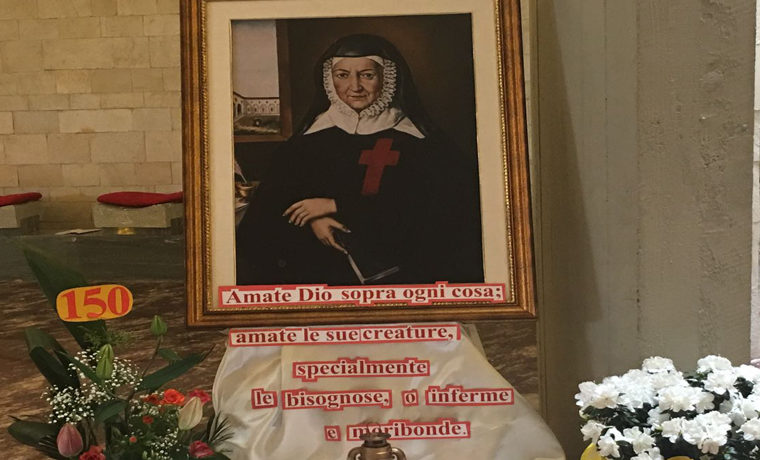

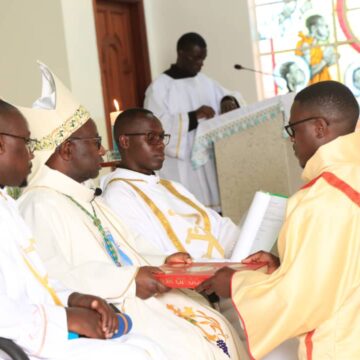

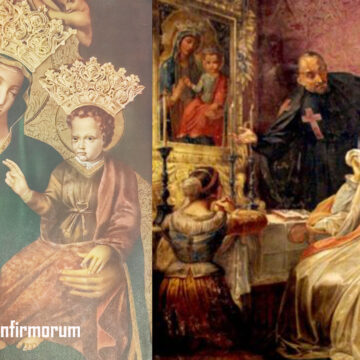

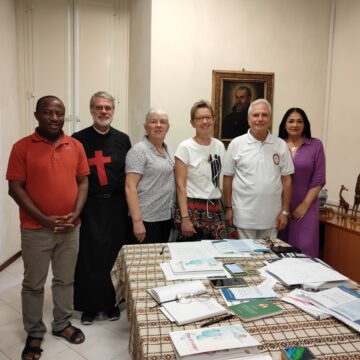

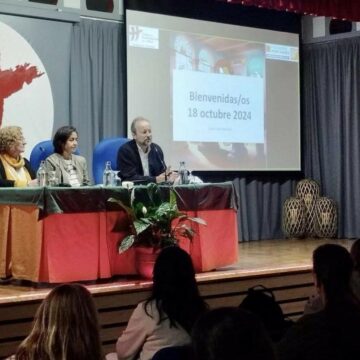
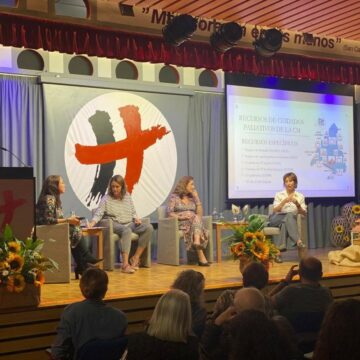
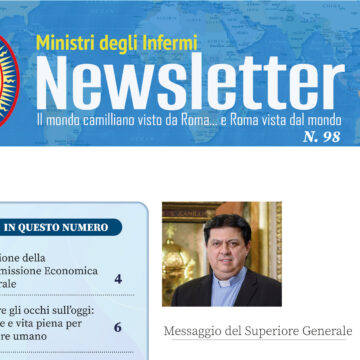
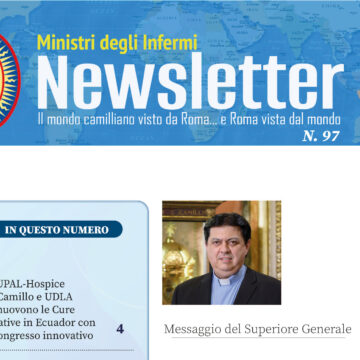
Camillians on Facebook
Camillians on Twitter
Camillians on Instagram